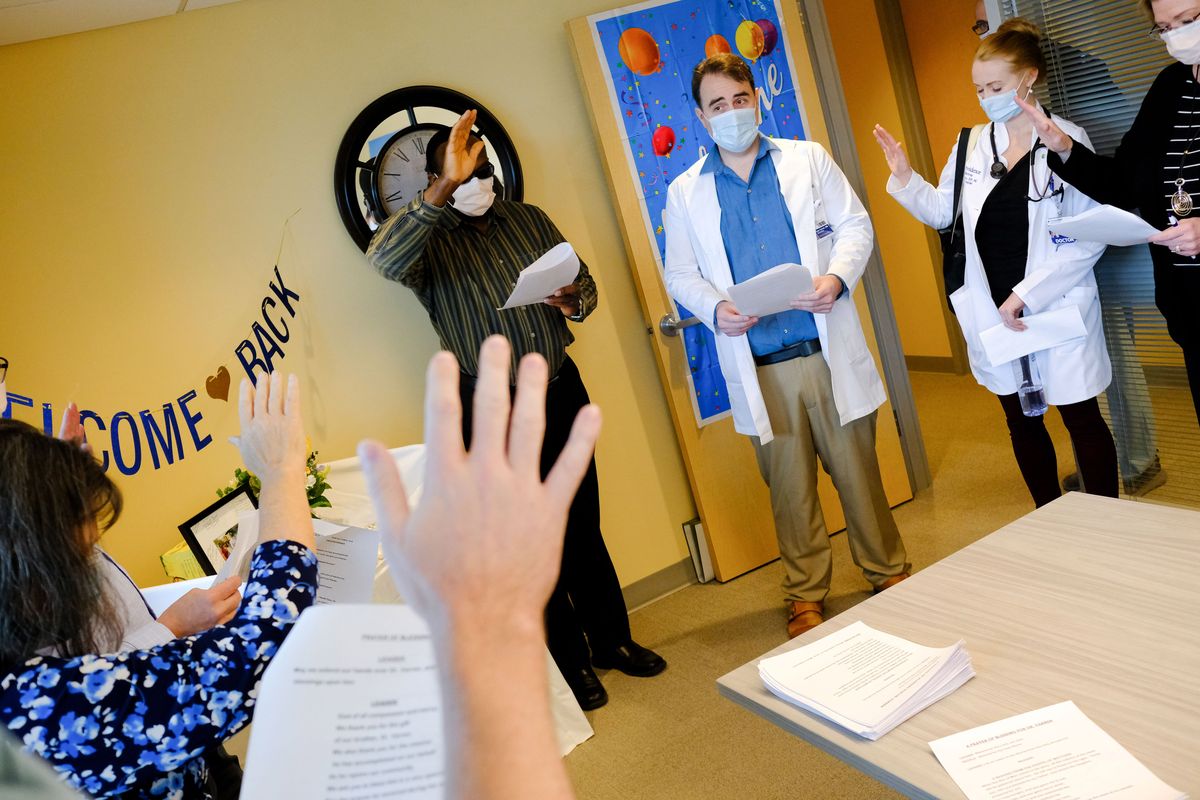‘A hometown hero’: After a month on the Ukraine-Poland border, Spokane doctor returns to Holy Family Hospital

Dr. Kyle Varner never expected to wake up to a 4 a.m. air raid siren.
But after a month along the Ukraine-Poland border organizing and providing urgent care to refugees, the Spokane physician understands the “chaotic situation” there.
On his first shift back at Providence Holy Family Hospital, he walked into a surprise during his break on Tuesday.
A dozen of his colleagues and hospital leaders applauded his efforts, blessing him and presenting him with some sweet treats and a photo of the day he departed with boxes full of supplies a month ago.
“You’re a hometown hero,” Susan Stacey, chief executive of Providence in the Inland Northwest, told Varner.
Varner’s colleagues agreed to cover his shifts while he was gone, and Susan Scott, Holy Family chief operations officer, said that staff members were grateful to have one of their own helping refugees fleeing the violence in Ukraine, as Russia continues its war there.
His plans to work in a hospital did not pan out while he was abroad, however, mainly because there was no need for additional physicians in hospitals along the border.
Varner said medical supplies donated from Providence were delivered to the hospital in Lviv and sent further east to hospitals that needed them.
“That’s the nature of responding early in a crisis,” Varner said, describing the rush of organizations and volunteers.
Western Ukrainian hospitals are fairly empty, he said, because they have canceled elective surgeries and stand ready to treat those from eastern Ukraine.
“The health care system in western Ukraine was not under a lot of strain and that’s, unfortunately, for a very sad reason: because the wounded and sick people in eastern Ukraine cannot be evacuated,” Varner said.
He met people who had to leave their elderly relatives behind because they would have been unable to tolerate a crowded 24-hour bus or train ride.
The doctor eventually found work at the border with a Polish aid group, where he worked in an urgent care capacity dressing wounds and giving sick people who had crossed the border medicine.
He also did site visits and needs assessments for Med Global, an organization he’s worked with before, to see whether the organization could be helpful along the border.
The situation was much different from previous refugee crises Varner has volunteered for, he said, mainly because the Ukrainians were welcomed with open arms once in Poland. Additionally, there are more medical services offered for those fleeing the violence.
Poland allows Ukrainians to access its health care system essentially upon entry, Varner said, which means they could call ambulances or get people higher levels of care much more easily than in other scenarios he’s worked in along the Colombia-Venezuela border.
Initially, there was some difficulty getting permission to practice medicine in Poland, due to medical licensing in the country, but he said that has since been worked out if a person is providing care under the medical auspices of certain organizations. In Ukraine, any foreign doctor who is licensed can practice. Varner said he is registered with the Ukrainian Ministry of Health.
“I won’t hesitate to go back if there’s a need for me to be there,” he said.
The group Varner volunteered with had people on both sides of the border, and they were able to divert people who might need medical care quicker than if they waited in line.
One couple from Spain had their days-old baby, who they had just picked up from a surrogate mother in Kyiv. The baby was at risk of hypothermia due to the extended amount of time they were waiting in the cold. Varner and volunteers got the baby warm and fed before arranging for the couple to get a cab to the bus station and continue their journey.
After spending a month meeting people and treating some of them, Varner said his view of the war remains the same.
Varner met one man who was stripped by the Russian military, supposedly looking for tattoos that are common for Ukrainian soldiers to have. He told Varner he would have been killed if they’d found one.
His story seems consistent with the reporting and images from towns like Bucha, which is just west of Kyiv, that reveal what many U.S. officials are calling “war crimes,” Varner said. An ABC News reporter found a man in Bucha who said all men under the age of 50 were killed when the Russian troops arrived.
“The intensity with which I feel the injustice is much greater, because now I’ve met these people and talked to people,” Varner said.